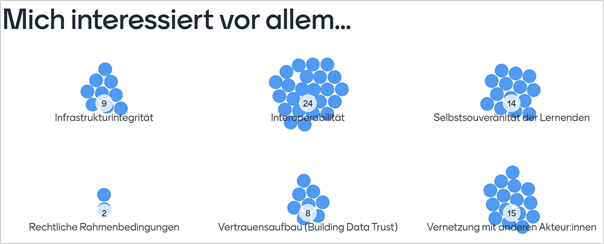Our virtual meeting with over 45 participants from similar projects and initiatives in Germany kicked off the joint activities with our stakeholders. Peter Hassenbach (Head of the Project Group "Nationaler Digitaler Bildungsraum - National Digital Educaction Space” at the German Federal Ministry of Education and Research) positioned DiBiHo as part of the lifelong Student Journey and addressed the relevance of Digital Credentials in the context of the German government initiative to create a Nation Digital Education Platform. Katrin Hauenschild (lead of the OZG Subject Education, Ministry of Finance of the State of Saxony-Anhalt) reported on her experiences of OZG implementation in the education sector, pointing out the challenges of federal education structures and raising questions about the longevity of digital certificates.
A general introduction to the joint project was given by Dr Hans Pongratz (Senior Vice President for IT Systems & Services, CIO, Technical University of Munich), Alexander Knoth (Chief Digital Officer, German Academic Exchange Service) pointed out that the recognition of academic certificates still poses an obstacle to international exchange. For this reason and against the backdrop of international student data mobility, the DAAD has a particular interest in finding interoperable technical approaches, he concluded. Prof Dr Christoph Meinel (Director and CEO of the Hasso Plattner Institute for Digital Engineering) reported on openHPI with its over 950,000 enrollments, arguing that the platform points to a need among users for lifelong learning and hybrid learning formats, and that this need could be met in with digital credentials in future.
A very similar approach was taken by Adj. Prof Dr Dominic Orr (University of Nova Gorica & Management atingi digital learning platform) in his keynote on the relevance of micro-credentials for international cooperation. He explained that the cumulative and systemic collection of skills and expertise in a person's profile as well as recognition between systems is an important step towards inclusive higher education.
In the subsequent workshop, the participant identified future user groups and mapped these to a technical stakeholder model as well as anticipating future challenges for the project. Stakeholders were particularly interested in the topics of interoperability, learner self-sovereignty, networking, and infrastructure integrity, and expressed a desire for more exchange amongst each other, which we will be happy to accommodate in future.
